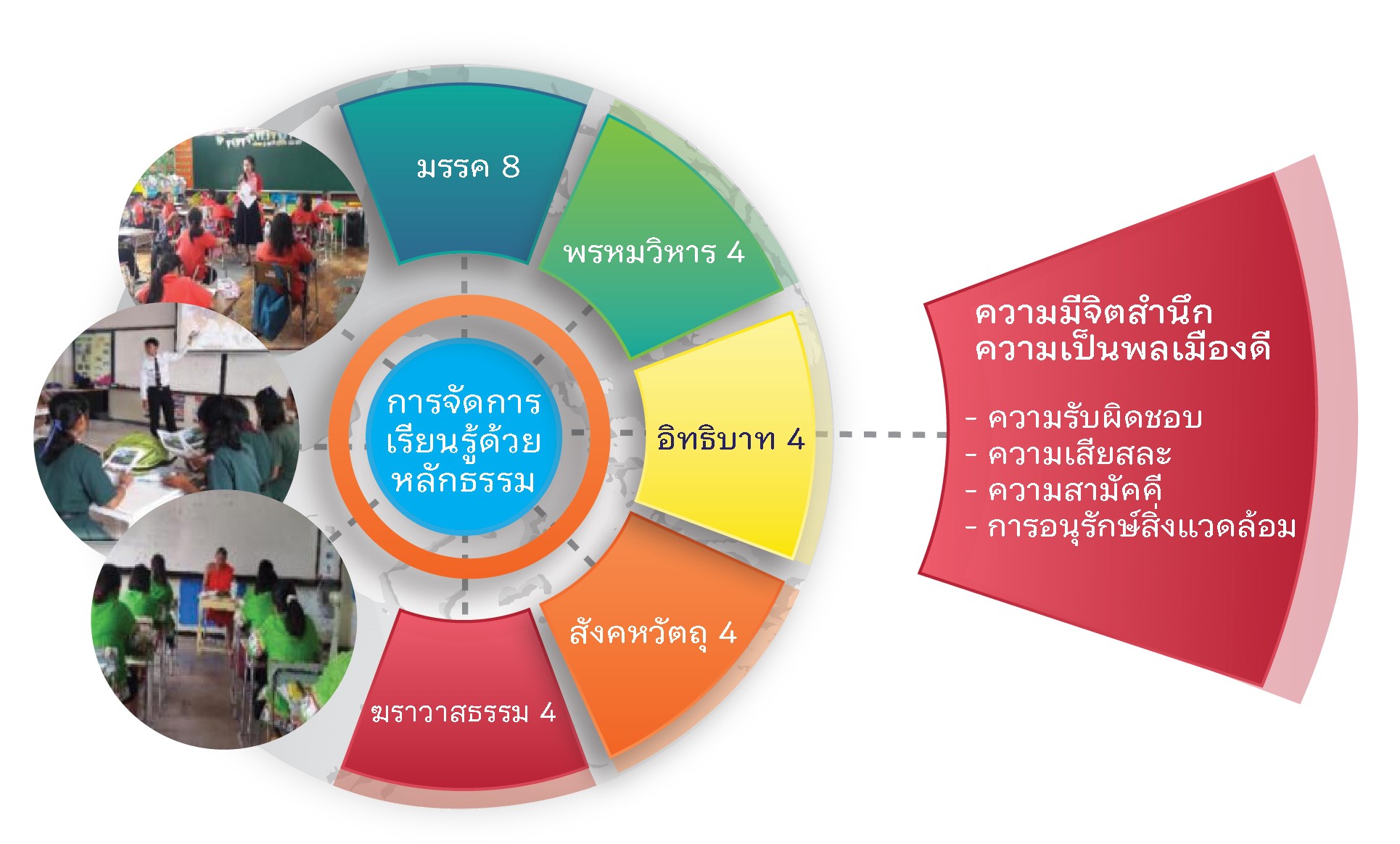The Development of Citizenship Awareness Among Grade 9 Students in Khon Kaen Province Based on Buddhadhamma Using the Four Noble Truths Process
Main Article Content
Abstract
The purposes of this research were: 1) develop and evaluate the effectiveness of a learning management plan using the Four Noble Truths process to instill public consciousness and Buddhadhamma of citizenship among Grade 9 students, meeting the 80/80 efficiency standard, 2) foster public consciousness based on Buddhadhamma using the Four Noble Truths process for Grade 9 students, 3) examine the Buddhadhamma of citizenship among Grade 9 students, 4) Investigate the satisfaction of Grade 9 students regarding learning activities conducted using the Four Noble Truths process focusing on public consciousness and Buddhadhamma of citizenship. This study is quasi-experimental research. The target group consists of 32 Grade 9 students selected through cluster sampling. The research instruments include: learning management plan utilizing the Four Noble Truths process focused on public consciousness, 1) an achievement test, 2) questionnaire on public consciousness, 3) questionnaire on good citizenship based on Buddhist principles, 4) satisfaction assessment form. The statistical methods used for data analysis include percentage, mean, standard deviation, and t-test analysis.
The results revealed that:
1. The efficiency of the learning management plan using the Four Noble Truths process, measured during the learning process (E1) and the outcome efficiency (E2) based on test results, was 82.81/95.56, which exceeds the predetermined criteria.
2. The public consciousness and Buddhadhamma citizenship of Grade 9 students, developed through the Four Noble Truths process, achieved an overall Efficiency Index (E.I.) of 0.7418. This indicates that the students' knowledge increased by 0.7418, equivalent to 74.18%.
3. The Buddhadhamma citizenship of Grade 9 students, on average, were at the highest level ( = 4.60).
4. The satisfaction of Grade 9 students with public consciousness and The Buddhadhamma citizenship principles of Grade 9 citizenship taught using the Four Noble Truths process was, on average, at the highest level ( = 4.57).
Article Details

This work is licensed under a Creative Commons Attribution-NonCommercial-NoDerivatives 4.0 International License.
เพื่อให้เป็นไปตามกฎหมายลิขสิทธิ์ ผู้นิพนธ์ทุกท่านต้องลงลายมือชื่อในแบบฟอร์มใบมอบลิขสิทธิ์บทความ ให้แก่วารสารฯ พร้อมกับบทความต้นฉบับที่ได้แก้ไขครั้งสุดท้าย นอกจากนี้ ผู้นิพนธ์ทุกท่านต้องยืนยันว่าบทความ ต้นฉบับที่ส่งมาตีพิมพ์นั้น ได้ส่งมาตีพิมพ์เฉพาะในวารสาร วิชาการธรรม ทรรศน์ เพียงแห่งเดียวเท่านั้น หากมีการใช้ ภาพหรือตารางของผู้นิพนธ์อื่นที่ปรากฏในสิ่งตีพิมพ์อื่นมาแล้ว ผู้นิพนธ์ต้องขออนุญาตเจ้าของลิขสิทธิ์ก่อน พร้อมทั้ง แสดงหนังสือที่ได้รับการยินยอมต่อบรรณาธิการ ก่อนที่บทความจะได้รับการตีพิมพ์References
กิตติยา วงษ์ขันธ์. (2561). การออกแบบการวิจัย รูปแบบการวิจัยเชิงปริมาณ การกำหนดตัวอย่าง และการวิเคราะห์ข้อมูล. อุบลราชธานี: ภาควิชาเคมี คณะวิทยาศาสตร์ มหาวิทยาลัยอุบลราชธานี.
จารุวรรณ ยิ่งยงค์. (2559). การพัฒนาคุณลักษณะความเป็นพลเมืองในระบอบประชาธิปไตยของนักเรียนชั้นมัธยมศึกษาปีที่ 1 ด้วยรูปแบบการจัดการเรียนรู้สืบสวนโดยใช้กระบวนการกลุ่ม สาขาวิชาการสอนสังคมศึกษา. กรุงเทพฯ: มหาวิทยาศิลปากร.
ชัยอนันต์ สมุทวณิช. (2547). ประชารัฐกับการเปลี่ยนแปลง. กรุงเทพฯ: สถาบันนโยบายศึกษา.
ดุษฎี สีตลวรางค์. (2525). การเปรียบเทียบวิธีสอนแบบไตรสิกขาและแบบธรรมสากัจฉาในสอนเบญจศีลและฆราวาสธรรม ในระดับชั้นมัธยมศึกษาปีที่ 1. กรุงเทพฯ: มหาวิทยาลัยศรีนครินทรวิโรฒประสานมิตร.
ทิพย์พาพร ตันติสุนทร. (2557). พลเมือง สิทธิมนุษยชน และประชาธิปไตย. กรุงเทพฯ: สถาบันนโยบายการศึกษา ภายใต้มูลนิธิส่งเสริมนโยบายการศึกษา.
น้ำผึ้ง โสดดี. (2560). การพัฒนาการเรียนการสอนแบบร่วมมือ โดยใช้บทเรียนคอมพิวเตอร์ช่วยสอนเพื่อเสริมทักษะการเรียนรู้ กลุ่มสาระการเรียนรู้ภาษาไทย เรื่องหลักภาษา สำหรับนักเรียนชั้นประถมศึกษาปีที่ 3. นครปฐม: มหาวิทยาลัยราชภัฏนครปฐม.
บุญชม ศรีสะอาด. (2556). วิธีการทางสถิติสำหรับการวิจัย. กรุงเทพฯ: สุวีริยาสาส์น.
ปัณพร ศรีปลั่ง. (2549). การพัฒนากิจกรรมเพื่อส่งเสริมจิตสาธารณะสำหรับนักศึกษาครุศาสตร์ มหาวิทยาลัยราชภัฏมหาสารคาม. ชลบุรี: มหาวิทยาลัยบูรพา.
พระมหาพุทธินันทน์ อภินันฺโท. (2561). การพัฒนาโปรแกรมบทเรียนตามแนวคิดอริยสัจ 4 เพื่อส่งเสริมความสามารถในการแก้ปัญหาวิชาพระพุทธศาสนาชั้นมัธยมศึกษาปีที่ 3. วารสารศึกษาศาสตร์ มหาวิทยาลัยมหาสารคาม, 12(2), 169-180.
ภาวดี รามสิทธิ์ และคณะ. (2554). การพัฒนาจิตสำนึกความเป็นพลเมือง กรณีศึกษานักศึกษาในสถาบันผลิตบัณฑิตทางการพยาบาล สังกัดสำนักงานคณะกรรมการการอุดมศึกษาเอกชน. กรุงเทพฯ: คณะพยาบาลศาสตร์ วิทยาลัยเซนต์หลุยส์.
ศักดิ์ชัย นิรัญทวี. (2541). บทบาทของมหาวิทยาลัยกับการศึกษาเพื่อความเป็นประชาสังคม. วารสาร สออ. ประเทศไทย, 1(1), 57-63.
ศิวพร เสนีวงศ์ ณ อยุธยา. (2529). การเปรียบเทียบความสามารถในการคิดแก้ปัญหาและผลสัมฤทธิ์ทางการเรียนชั้นมัธยมศึกษาปีที่ 2 โดยวิธีการขั้นที่ 4 ของอริยสัจกับการสอนตามคู่มือครู. กรุงเทพฯ: คณะศึกษาศาสตร์ มหาวิทยาลัยศรีนครินทรวิโรฒประสานมิตร.
สำนักงานคณะกรรมการวิจัยแห่งชาติ. (2542). วาระการวิจัยแห่งชาติในภาวะวิกฤตเพื่อฟื้นฟูชาติ. กรุงเทพฯ: สำนักงานคณะกรรมการวิจัยแห่งชาติ กระทรวงวิทยาศาสตร์ เทคโนโลยีและสิ่งแวดล้อม.
Desforges, C., & Abouchaar, A. (2003). The Impact of Parental Involvement, Parental Support and Family Education on Pupil Achievement and Adjustment: A Literature Review. London: Department of Education and Skills.
Fan, X., & Chen, M. (2001). Parental Involvement and Students’ Academic Achievement: A Meta-Analysis. Educational Psychology Review, 13(1), 1-22.
Tuckman, B. W. (1999). Conducting Educational Research. (5th ed.). U.S.A.: Harcourt Brace & Company.

